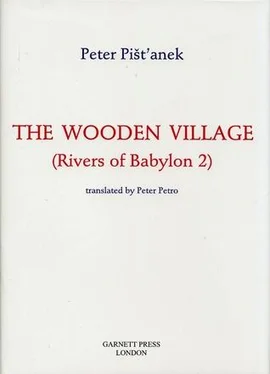Peter Pišťanek - The Wooden Village
Здесь есть возможность читать онлайн «Peter Pišťanek - The Wooden Village» весь текст электронной книги совершенно бесплатно (целиком полную версию без сокращений). В некоторых случаях можно слушать аудио, скачать через торрент в формате fb2 и присутствует краткое содержание. Год выпуска: 2008, Издательство: Garnett Press, Жанр: Современная проза, на английском языке. Описание произведения, (предисловие) а так же отзывы посетителей доступны на портале библиотеки ЛибКат.
- Название:The Wooden Village
- Автор:
- Издательство:Garnett Press
- Жанр:
- Год:2008
- ISBN:нет данных
- Рейтинг книги:3 / 5. Голосов: 1
-
Избранное:Добавить в избранное
- Отзывы:
-
Ваша оценка:
- 60
- 1
- 2
- 3
- 4
- 5
The Wooden Village: краткое содержание, описание и аннотация
Предлагаем к чтению аннотацию, описание, краткое содержание или предисловие (зависит от того, что написал сам автор книги «The Wooden Village»). Если вы не нашли необходимую информацию о книге — напишите в комментариях, мы постараемся отыскать её.
The Wooden Village — читать онлайн бесплатно полную книгу (весь текст) целиком
Ниже представлен текст книги, разбитый по страницам. Система сохранения места последней прочитанной страницы, позволяет с удобством читать онлайн бесплатно книгу «The Wooden Village», без необходимости каждый раз заново искать на чём Вы остановились. Поставьте закладку, и сможете в любой момент перейти на страницу, на которой закончили чтение.
Интервал:
Закладка:
“What will you have for breakfast, Lady?” Eržika asks.
Lady turns her gaze to her. She smiles. “A big bowl of muesli and milk,” she says. “A big chilled glass of fruit nectar. And a cup of delicious aromatic coffee,” she adds.
Feri’s and Eržika’s mouths drop.
“Wouldn’t sausage and mustard do?” Feri asks uncertainly.
Lady says nothing. As always, when she doesn’t know what to do, she smiles.
“Of course,” Eržika agrees on her behalf. “Lady must have a good breakfast if she’s going to face a hard day like that.” Eržika will even order coffee for her. “But the snack bar doesn’t stock that mussels and tar.” Eržika once asked for those things once, she knows all about it. She, too, comes from a good family, just like Lady, Eržika makes it clear. She gives Lady a sidelong glance: Lady sits on the rough bench very stylishly, with one leg crossed over the other. Eržika’s father is a butcher, Eržika goes on in her weepy, querulous voice. Eržika was once engaged to none other than Rácz. If Lady is a city girl, she must know who Eržika is talking about.
Lady shakes her head and smiles. No, she doesn’t know who she is talking about.
Eržika raises her voice insistently. How can Lady not know about Rácz? Didn’t she see on TV the ad for the Oxford Privatisation Fund when Rácz was sitting there talking about it? That Oxford belongs to him. He is the biggest crook on earth. Oxford indeed! Actually, he only graduated from two-year agricultural college! He transferred there from the sixth grade of primary school. That’s all his Oxford. He’s a tractor-driver, for Christ’s sake.
Proud Feri interrupts her. This can’t be of any interest to Lady, he tells her gently in Hungarian.
Feri knows Eržika pretty well and understands her disappointment over the broken engagement to Rácz. She only just missed having an easy life in an enormous high-class villa above the city, while being with Feri Bartaloš has meant being in the lavatories down here. That’s why he is not too hard on her; he feels as if it was partly his fault.
Eržika calms down. Then she goes back to the original topic. Sausage and mustard will give Lady more energy than any mussels and tar, Eržika says with authority. She signals to Feri to get Lady’s food.
Feri crosses the Wooden Village with dignity. Four-Eyes’ single eye, hidden by dark glasses, makes his stare hostile.
While Lady finishes her food and drinks her coffee, the first client, a youthful drinker who took three turns yesterday, shows up. He clutches the money in his hand. Soon he vanishes with Lady into Piggybank’s trailer.
“A good start,” says Eržika, putting the money in her bra.
Feri is pleased, too. He rubs his hands. “This calls for two cognacs,” he suggests.
Eržika doesn’t mind.
They drink cheap brandy from plastic cups and watch the trailer barely perceptibly wobbling on its springs. The rhythmical motion of Freddy’s trailer is easiest to see from the regular sinusoid oscillation of the electric cable hanging between the trailer and the hotel.
By the time the beer drinker is satisfied and finished, Eržika has put away money from two more interested clients. They patiently wait their turn with their beer and gin and ogle Piggybank’s trailer. When the door opens the client whose turn it is strides over to the car park.
“How was it?” Eržika asks the beer drinker and smiles. “Are you having three goes today, too?”
The beer drinker shakes his head. “It was better yesterday,” he says. “No comparison.” He blushes; he feels awkward talking about these things with a woman, even if she is a pimp.
He finally confides in Feri, in a friendly way: “Lady just lies there like a corpse, no passion, no spark. Her fire’s gone out, as they say.”
“Is she asleep?” Feri asks.
“No,” says the beer drinker. “Her eyes are open and she’s thinking about something.”
Neither the second, nor the third client is happy. Feri waits for the fourth one to leave Piggybank’s trailer and then enters.
Lady is lying on the attendant’s messy bed with her arm under her head.
“What’s wrong?” Feri asks her. “Are you in pain? Tired?”
Lady shakes her head.
“Well, what’s wrong then?” Feri enquires. “You wanted men and I’ve sent them to you. And now you don’t seem to like it any more.”
Lady says something, but so quietly that Feri can’t understand her.
“WHAT?” he asks, his head bent towards her.
“That smell,” says Lady. “Yesterday. In the lavatory.”
“In the lavatory?” Feri is stunned. “You mean the men’s lavatory?”
Lady nods imperceptibly and covers her exposed crotch.
“I need that smell,” she says categorically.
Feri grabs his head in a panic. “Jesus Christ!” he says. He sits down on the bed and looks blindly in front of him. What is he to do? He gets up and looks round. Freddy Piggybank is arguing outside with a customer over payment. Proud Feri unzips his fly and urinates in a corner of the trailer.
“Is that what you want?” he asks Lady. “Will that do?”
Feri doesn’t even want to imagine the weird form Piggybank’s anger will take later that evening, when he finds out that someone has pissed in his trailer. But business is business.
Lady takes a deep breath and nods her head contentedly. Fully roused, her hand reaches for Feri’s fly. Feri backs out of the trailer in horror.
* * *
And so Piggybank began his studies in the Brick-making Technical School in Hodonín, returning home only for weekends and holidays. Around Christmas, Freddy and his parents moved into their new house.
His old school friends had lost interest in him and members of his old gang were forbidden to mix with him. Freddy had no option but to push his way into another children’s gang and declare himself its captain. This time the children came from village areas called Little Hill and Mansion. They were all boys.
Freddy missed the inquisitive intimacy of the girls in the brickyard settlement, but, anyway, the girls had stopped playing with boys of their age. They were becoming young women and, after their first periods, they kept to strictly segregated girl groups bonded by various secrets, and so on.
Interacting with his contemporaries and elders, Freddy came across as insecure and taciturn; he was more stupid than most, but had enough self-awareness to know that the more he spoke, the more obvious was his stupidity. He did not have this problem with younger friends; he was still cleverer than the cleverest of them and that ensured his status as leader.
At that time a phantom attacker was terrorising Nová Ves and its surroundings. He attacked and raped women going home on their own in the evening. The children gave him the name of Strangler. The Strangler was supposed to ride a Jawa 21 motorcycle with the number plate hidden. He was supposed to wear a long coat and nothing under it. He had military style boots. According to some rumours, he had a wall-eye. He was said to be hiding in the woods around the Nová Ves.
Freddy Piggybank felt he was the protector of his native village. His greatest ambition was to track down the Strangler, catch him and parade him in front of the chairman of the People’s Council. In a word, he longed to be a hero, for it upset him that nobody took him seriously.
So, every weekend he and his gang would comb through the thick groves and scrub around Nová Ves, but they couldn’t find the Strangler, no matter how hard they tried. One day, above the heart-shaped quarry they discovered a sort of camp. There were two dugouts covered by branches, a campfire site surrounded by blackened rocks, and a totem pole. The totem pole looked scary: some wild beast’s big, popping eyes, with a beak, wings and a long tail with scales wound around the entire pole. It inspired fear.
Читать дальшеИнтервал:
Закладка:
Похожие книги на «The Wooden Village»
Представляем Вашему вниманию похожие книги на «The Wooden Village» списком для выбора. Мы отобрали схожую по названию и смыслу литературу в надежде предоставить читателям больше вариантов отыскать новые, интересные, ещё непрочитанные произведения.
Обсуждение, отзывы о книге «The Wooden Village» и просто собственные мнения читателей. Оставьте ваши комментарии, напишите, что Вы думаете о произведении, его смысле или главных героях. Укажите что конкретно понравилось, а что нет, и почему Вы так считаете.












